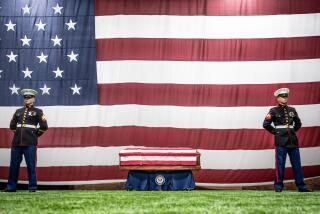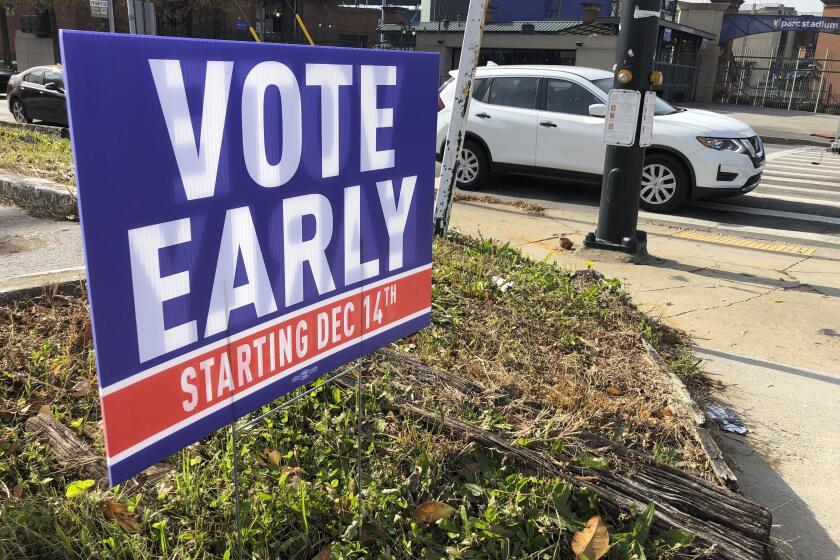Marines of Force Recon Set the Stage in Fallouja
FALLOUJA, Iraq — Soon, the Marines would be marching forward in Great War-style formations on a chilly, rainy evening imbued with a sense of the apocalyptic. But for now, the troops crouched in foxholes gouged from the desert north of Fallouja, scanning the fireworks.
An immense barrage of air and artillery strikes rained down on the rebel-held city, and the Marines roared with every blast. Force Recon was at work.
Almost two days before the battle for Fallouja, the Marines’ elite Force Reconnaissance units had infiltrated the northern periphery of town. They had dug into “hide sites” and “shaped” the future battlefield, calling in guerrilla positions for the spectacular bombardment that preceded the invasion.
“ ‘Shaping’ the battle is making the enemy do what you want him to do,” said Marine Gunnery Sgt. Ed McDermott, 35, of Force Recon. “You drop bombs on him. You make him pull back. You subject him to direct and indirect fire. You cut off his supply lines.”
The prevailing narrative of the fight for Fallouja was the dominance of 12,000 U.S. and Iraqi troops over a spirited but outgunned and outmanned insurgent army.
Little noticed outside Marine circles was the important role of the several dozen troops of Force Recon, who reported on insurgent positions, spearheaded attacks, covered advancing infantrymen and squeezed off sniper rounds at unsuspecting bands of guerrillas.
“Force Recon provided us with some tremendous capabilities,” said Col. Craig Tucker, who headed one of the two major battle groups that descended on this city last month. “I just can’t say enough about the job they did.”
The specially trained Marines are similar to Navy SEALs and Army Green Berets and Rangers. Their precise role is often shrouded in secrecy, but a group attached to the 1st Battalion of the 8th Marine Regiment during the battle of Fallouja agreed to talk as the fighting raged.
“We enjoy what we do,” said Capt. Jason Schauble, 29, a Force Recon commander whose platoon suffered casualty rates of more than 50% during the fight, though most returned to action. “There’s a lot of risks, but we’re all volunteers. We understand the risks.”
They spoke late at night in this blacked-out and devastated city from their perch in a darkened fourth-floor apartment that once housed guerrilla gunmen.
In one of the rooms, Staff Sgt. Mark Detrick lay on his stomach in classic sniper position, his rifle balanced on a tripod, its muzzle protruding through a punched-out hole in the wall. “They don’t have a clue what’s coming,” Detrick said, scanning the ruins of the city to the south, where unseen combatants were still dug into the rubble and moving about.
The platoon’s push into Fallouja had been difficult. Guerrilla squads of four to six fighters attacked from fortified positions in abandoned homes, alleyways, courtyards and on rooftops.
“We were shooting in all directions,” Schauble said, recalling that first full day inside Fallouja. “There were enemy coming out, setting up mortars. There was enemy firing [rocket-propelled grenades], enemy firing machine guns and small arms. We shot all day, at different targets.”
Guerrillas in sneakers and track pants scurried from house to house, using weapons caches pre-positioned in anticipation of the U.S. attack that everyone knew was coming.
At that point in the battle, the unit’s task was to support the Marine riflemen who were advancing into the city. The Force Recon team was watching the flanks, where the insurgents, seeking to evade prowling U.S. armored vehicles, chose to attack.
“They found the seam -- where we ended up being,” Schauble said.
But Force Recon’s role in the battle had begun earlier, when Marines hunkered down in the northern periphery of the city. They identified spots where troops on foot and in vehicles could cross the railroad tracks and pierce guerrilla defenses. Then they observed enemy positions.
On the evening of Nov. 8, the massive, pre-invasion bombardment of Fallouja began.
“We used F/A-18s, we used Harriers,” said a pilot who served as forward controller. “When we needed it, we’d call in a strafing run,” added the lanky, 37-year-old Marine, an officer who asked to be identified only as Frisky.
The Force Recon Marines advanced into the ominous streets of Fallouja. The gunfire, tracers and rocket flashes subsided as dawn approached. But first light broke with a renewed crescendo of gunfire. Guerrillas in ambush positions opened up from all sides. Some Marine units were pinned down for hours.
A Navy corpsman working with the Force Recon unit was hit in the back shortly after sunrise. Everywhere there was fire, some from the enemy, some from nearby Marines.
Detrick, under heavy fire, scampered into an open area on his way to what he hoped was a more secure position.
“As we were crossing to go, some machine gun and something else [coming] from an alley just lit my team up,” Detrick, 29, recalled. “Right off the bat, my assistant team leader, he got hit and he was down, KIA [killed in action] automatically.”
Detrick and others took cover at a garbage Dumpster, cut off from the rest of their unit. “As I was crawling up, they shot an armor-piercing round through that Dumpster,” Detrick said. “It hit the ground in front of me and bounced off my left forearm. Hit the wall behind me and came back at me.”
The staff sergeant got a good look at the round. The memory lingers: “It was basically a steel bullet about a foot and a half long, an inch in diameter.”
Fortunately, the lethal projectile, meant to pierce tanks, didn’t explode.
The firing leveled off about midday, as it often did during the fighting in Fallouja. The insurgents were inclined to take a break, grab a bite, maybe take a nap, before resuming their labors in the afternoon, Marines said. The respite gave the Americans an opportunity to retrieve the body of their comrade.
But by 4 p.m. that first day, the streets again resounded with gunfire, the crackling rounds of Kalashnikovs and the steady thuds of M-16s.
To the east of a Force Recon position, a group of insurgents was suddenly flushed from an alley. They jetted down an open street, apparently trying to join colleagues retreating to the city’s southern reaches. Within minutes, four were slumped over, cut down by intense Marine fire. One of them had lugged a heavy machine gun and had several belts of large-caliber ammunition slung on his shoulders. The Force Recon troops say the four were probably responsible for the death of their comrade.
“There’s a very good chance we got all or part of those guys who killed our guy,” said the officer called Frisky. “I think it’s important to mention that.”
At nightfall on Nov. 9, the shooting subsided again. The Force Recon men joined other Marines in a tank-escorted formation headed south to the Al Hadra al Muhammadiya mosque, a former insurgent stronghold taken earlier in the day by U.S. and Iraqi troops after a short gun battle. Many Marines would rest here for the first time in 48 hours.
But the numbing pattern of fighting and advancing was unrelenting. On Nov. 12, three Force Recon Marines survived a pair of rocket-propelled grenades that blasted the apartment where they were holed up. Cpl. Frank Delgado was knocked unconscious by a separate RPG barrage and pulled from the rubble; he was later shot as Marines exchanged fire with attackers positioned in another mosque. Delgado was evacuated and survived.
In all, 13 of Schauble’s platoon of 24 would be eligible for Purple Hearts for injuries sustained in the battle for Fallouja. Several, among them Detrick and Delgado, are in line for multiple Purple Hearts.
The rebels who had held sway for so many months in Fallouja were soon on the run, pushed south in an increasingly desperate struggle.
“It’s likely some of the leaders left town and left their subordinates to fight the fight,” Schauble said. “But we thought it was important to seize this city, to show the insurgents we were willing to go in.”
More to Read
Sign up for Essential California
The most important California stories and recommendations in your inbox every morning.
You may occasionally receive promotional content from the Los Angeles Times.










